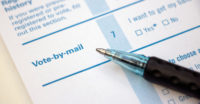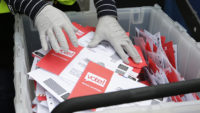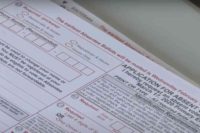Absentee / Mail-in Voting
All states have some form of absentee or mail-in voting due to federal requirements. These voters normally include military and overseas citizens, voters with disabilities and students who reside in a different state. For example, absentee or mail-in ballots are sent to these military and overseas voters 45 days prior to federal elections. However, absentee or mail-in voting is often limited by states to a number of valid excuses based on age, absentee status or an inability to vote on Election Day.
Some states have a greater number of reasons and valid excuses to vote absentee ballots by mail or in-person in an election office. A number of states have no-excuse absentee or mail voting. Lastly, a number of states have implemented an entire method of mail-in balloting that includes return of ballots to secure boxes or by postal mail. Oregon instituted an all-mail-in balloting system in 1998 and other states like Washington and Colorado have instituted similar all mail ballot methods of voting.
Mail-in and absentee balloting provides certain vulnerabilities to the electoral system:
- One stated general purpose for no-excuse absentee or mail ballot voting is to increase convenience and reduce long lines on Election Day. However, “Election Day” has become “Election Month,” which has increased the overall costs of election administration. County election offices that must process a large number of mailed ballots will experience significant delays in releasing official election results. A month or more of voting dramatically increases the overall costs to political campaigns for poll watching and get-out-the-vote efforts prior to Election Day.
- Mail-in ballots are not cast in the secure polling place where precinct poll workers can confirm addresses and verify identification. A great deal of voter fraud and abuse of absentee and mail-in ballots has been documented across the country. Absentee or mail-in balloting may spur a short-term increase in turnout in local elections; however, there is no evidence that voting by mail increases overall turnout for the long term in general elections.
- Absentee or mail-in balloting requires the use of the U.S. Postal Service (USPS) to transmit and return the ballot. This often causes delays to the election office. Citizens in states that use mail-in ballots often authorize the return of ballots to secure mail boxes that voters can use if they distrust the postal service.
A number of states authorize or require in-person absentee voting with verification by voter ID, and some states require a voter ID at the time of absentee or mail-in ballot request or return.
Alternatively, many states that allow absentee or mail-in voting use signature comparison to verify the identity of the voter. Many believe that signature verification is error-prone and not uniformly implemented by election officials across the country. While signature verification does catch a small percentage of invalid ballots or voter fraud, the system often fails to identify a great many irregularities associated with absentee or mail-in voting. Alternatively, many argue that signature verification routinely disenfranchises thousands of voters when it is used to ferret out an invalid signature.
ACRU Commentary
Michigan math: Detroit has 30K more registered voters than eligible voters
A few weeks ago, ACRU named MI Governor Whitmer “Crisis Tyrant of the Week.” We could add “Vote Fraud Promoter of the Year” to her credentials. Whitmer is sending absentee ballot request forms to both legal MI voters AND 30,000 ineligible voters still on voting rolls in Detroit alone. The state has records of who moved and who died. It would be an easy place to start protecting real voters casting legal votes. Whitmer, so far, is a “no” on integrity measures.
ACRU’s von Spakovsky: Texas judge appoints himself pretender king of absentee ballot island
ACRU Senior Fellow Hans von Spakovksy with Zack Smith writing for the Heritage Foundation notes the U.S. Supreme Court determined Americans do not have a right to vote by absentee ballot through the mail. But never mind all that, says Texas Judge Fred Biery. Judge Biery is widely known for his bias against religious freedom. Now he can also be famous for elevating his own biases against decisions made by our nation’s highest court.
Adams & von Spakovsky: America’s hidden voting epidemic? Mail ballot failures
A new report has revealed how vulnerable voting by mail can be. It should alarm all who are pushing for all-mail elections: Based on federal data from the U.S. Election Assistance Commission, millions of mail ballots were never counted as completed votes.
Add These Voter Fraud Cases to the Growing List
4/19: Despite the lack of media coverage, evidence of election fraud continues to mount.
Judge Upholds Alabama Voter ID Law in Win for Common Sense
1/17: A federal judge in Alabama has thrown out a lawsuit against the state’s voter ID law, finding that the law doesn’t prevent anyone from voting.
The Obstruction of a Vital Election Integrity Commission
1/9: The commission may be dissolved, but the mandate from mainstream Americans to protect the integrity of our elections remains.
News
Liberals’ documentable plan to destroy election security
Journalists Rebecca Mansour and Jim Pinkerton provide a remarkable and detailed overview of the specific steps liberals and their Democrat allies will take to try to win the 2020 election by cheating and creating chaos. This is an important read for anyone concerned with the integrity of our electoral process.
Mail-in ballot chaos in Brooklyn as nearly 100,000 voters get mislabeled return envelopes
In addition to fraud and vote manipulation, mailed votes—and your voice—can also be lost to gross incompetence. Vote In Person!
Project Veritas uncovers ‘ballot harvesting fraud’ in Minnesota
A ballot-harvesting racket in Democratic Rep. Ilhan Omar’s Minneapolis district — where paid workers illegally gather absentee ballots from elderly Somali immigrants — appears to have been busted by undercover news organization Project Veritas.
Groundbreaking National Voter Roll Study Reveals Alarming Trends as States Prepare to Vote by Mail
Our colleagues at PILF have performed an extensive nationwide study and found U.S. voter rolls are full of errors, deceased voters and duplicate registrations. They found nearly half a million problems -- how many remain undiscovered?
Democrat Michigan Secretary of State Misprints Trump Ticket on Ballots for Troops
The Michigan secretary of state misprinted the Trump line on ballots intended to be mailed to troops serving overseas, the Detroit News reported.
More than 18,000 mail ballots not counted in Florida’s March presidential primary
The report from the national Healthy Elections project said the uncounted ballots came in late or had "defects" that prevented them being counted.More than 18,000 Floridians who voted by mail in March’s presidential primary did not have their votes counted, according to an analysis done by a group of national elections experts and academics.












